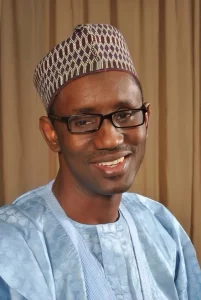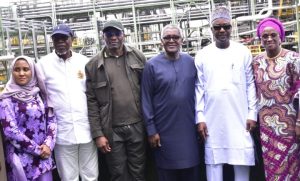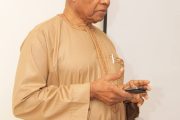Things are not going well for business magnate, Aliko Dangote. Dangote’s mega intervention in building a mega refinery is suddenly confronting unexpected tackles. The details are overflowing in the social and traditional media which is the battlefront where the elite settle and unsettle their quarrels. Whichever details one selects to believe, the larger theme within which to understand the tension is state-business relationship in Nigeria.

Africa’s banking voice, Akinwumi Adesina has not found the tussle funny.
Pix: The Cable
National efforts at social transformation is at the core of politics in every other country in the world today. That makes either the category known as the national bourgeoisie or state interventionism crucial variables. Intervention cannot think of where the contrary applies right now.
Today, the Nigerian State and those who have controlled it since the mid -1980s have bought the neoliberal gospel that the state has no business in business. So, the Nigerian State has been foolishly divesting from well thought out state owed enterprises in the 1970s. Ajaokuta is limping, ALSCON is gone. NEPA too as well as vehicle manufacturing companies, not to talk of Cement, hotels, banks and so on. As an observer pointed out in 2000, the paradox of de-statisation in Nigeria is that it is Chief Obasanjo who superintended the state companies in the mid-1970s is also the one who presided over their sale in the 2000s.
The Obasanjo regime, however, approached the disinvestment with a certain creativity through an agenda of creating a club of national business players with some capacity for operationalising a variant of national capital. It is an inchoate approach but a case of half bread being better than none.
Intervention would argue that, today, Dangote is, arguably, the synonym for that experiment. A proper understanding of this context would have meant that a Dangote should be an untouchable player not because he is an angel but because he is carrying out a national assignment, with a license to even misbehave without punishment.
In industrial economies, the Dangotes have a collective oversight over state power. In the US, for example, they are the ones who decide when the American State goes to war or sues for peace in any conflict anywhere in the world. They dictate terms because they built the economy, rendering the state completely dependent on their wisdom in matters of state policy.

National security czar, Nuhu Ribadu
This is the reason why King’s College London’s Alex Callinicos talks about the capitalist and territorial logic of state power in great power geopolitics in his famous 2007 essay, Does Capitalism Need the State System? Although Callinicos was shooting his critics from his own variant of Marxism, his location of Marxism in Realist analysis enabled him to project a picture of contemporary global politics that has been substantially correct since 2007.
A Nigeria with aspirations to be a major player in the world rapidly unfolding ought not to be seen in any form of antagonistic relationship with anyone in the category of business cabal Obasanjo created. It bears repeating that this is not because they are well behaved but because they constitute the most viable national instrument or condition of possibility for any form of capitalist modernization in the current context of class and state foolishness in Nigeria’s approach to divestment. Our praxis in relation to them cannot, therefore, derive from a sense of personal injury or a moral angst. It has to be the pragmatic frame of reference if we know what we want. There is a national security implication in undoing them in the context of current balance of the variables vis-à-vis national economic transformation.
Stories to the effect that Dangote is having it tough because he supported one candidate against another in the 2023 struggle for power ought not to have even made it to the public sphere. It does absolutely no credit to the Tinubu persona, leadership or regime that such a story is circulating in the public sphere at all. The hope is that the regime can undo the damage quickly enough.
Otherwise, President Tinubu would be demeaning himself by showing that he has not come to terms with the imperative for whoever becomes the president of Nigeria to forget about settling scores with anyone else because that office is too powerful for any such score settling to be anything but the most unequal test of strength. Nature and God abhor such a test of strength because of the imponderable consequences. Doesn’t the secret service brief Nigerian presidents on these matters?

Peace makers from the Nigerian HoR
Dangote is not enjoying anything exceptional. Long before now, it has been argued in small study circles that corruption suspects such as Bola Tinubu, Orji Kalu and a few others should be let go. And the only reason for that has been that as much as they may have triffled with state resources, they have media houses employing journalists with families. A child from any of these families could somehow become a president of Nigeria tomorrow through education funded from salaries paid by any of these media houses. The analysis is not an endorsement of corruption but reference to relativity in meaning making. And we were drawing on a similar analogy advanced by the late Talban Bauchi, Dr Ibrahim Tahir in his famous argument for a closure on corruption in Nigeria. It is to that extent that Dangote can be excused for the “infraction” of not supporting whoever.
Intervention remains convinced that i is the duty of the government of the day to conscientise the country that Nigeria is where it has no alternative to an instrumentalist view of all of them in that category – Jim Ovia, Dangote, Otedola, Elumelu, etc. It is assumed that, if nothing else, all those involved in managing the Dangote factor in the national economy understand his context of his becoming.
In the event of any emergency in so fluid a world, it is our own variants of capitalists, no matter how ‘baby capitalists’ they may be who alone can save us. That is the national security complication of the on-going but needless trivialization of such a crucial variable in nation making. It could still be morning on creation day oh!




























